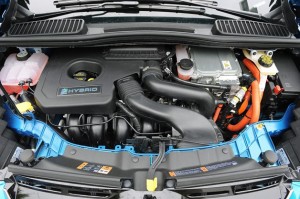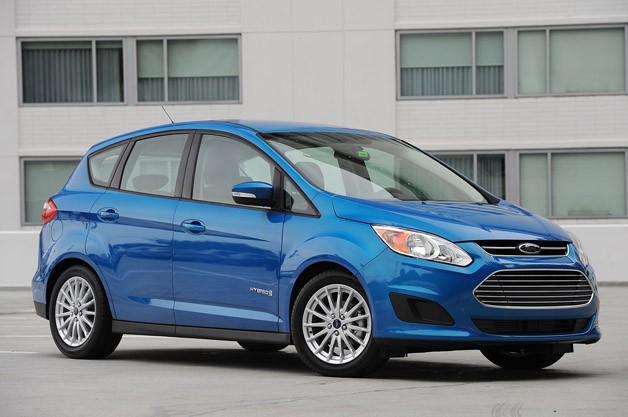For the first time since the Prius hit the streets more than a decade ago, there is another hybrid that’s arguably a better hybrid. Because it’s a different kind of hybrid.
The un-hybrid.
The Ford C-Max.
It’s stubby – but tall – which means it’s got more room inside than the standard-issue Prius sedan. But it’s not as long as the Prius V wagon – so it’s more maneuverable in tight confines.
It gets close to the same gas mileage as the Prius hatchback – and better gas mileage than the Prius V wagon.
Plus, it’s quick – and speedy – two things no Prius is.
How’s zero to 60 in 8 seconds – vs. 10.3 seconds for the Prius wagon, 10.1 for the regular Prius and 11.3 seconds for the smaller (and much slower) Prius C?
The snarky Ford hybrid also averaged 36.6 MPG with me driving it. With you driving it – and not driving it at a steady 80 on the highway and up and down 9 percent grades out here in Hillbilly Land – reaching the EPA rated 47 MPG average should be absolutely doable.
As OJ used to say, look out!
The C-Max is Ford’s answer to the Prius – and a more fuel-efficient alternative to non-hybrid small crossovers.
It’s slightly smaller end to end than a regular Prius, but taller-roofed and more spacious, with 54.3 cubic feet vs. 39.6 cubic feet of total cargo capacity, plus more head and legroom for passengers.
More importantly, it moves when you push down on the gas pedal.
Its EPA rated 47 city/47 highway (47 average) isn’t quite as high as the 51 city/48 highway (50 average) the Prius hatchback delivers – but it’s close. Ford is banking on the notion that there are lots of people out there who won’t object to sacrificing a few MPGs in exchange for a lot more fun – in a more aesthetically and functionally attractive package.
Base price is $25,200 for the SE. A top-trim SEL stickers for $28,365.
In comparison, the base model Prius (regular version) is slightly less expensive to start at $24,200 but it tops out over $30,000 for the “5” trim.
A Prius wagon – which has more cargo space than the C-Max but which only gets 44 city/40 highway – starts at $26,650.
A Prius C – which starts at $19,080 – is the bargain of the bunch, but it’s much smaller inside and outside and slower than Forrest Gump after eight bong hits (11.3 seconds to 60).
Another potential cross-shop is Honda’s Insight hybrid – which like the Prius C is more affordable ($18,600 to start) but it’s also much lethargic (0-60 in 10.3 seconds) and has much less room inside (especially in the back seat area).
Ford also sells an “Energi” plug-in version of the C-Max, which will be reviewed separately. It lists for $32,950 and competes with the plug-in version of the Prius.
WHAT’S NEW
The C-Max is a brand-new model . . . in the U.S. (more on that below).
It’s much quicker than any Prius.
It’s much more fun to drive than any Prius.
It still gets almost-Prius gas mileage.
Tremendous headroom; this is the Tall Person’s Hybrid.
Impressive cargo room for its small footprint.
Not-too-techy interior/gauge layout.
Hump (for the batteries) in the cargo area.
Slightly pricier than regular Prius.
A lot pricier than Prius C.
Not as roomy inside as Prius V.
Some secondary controls (audio system) are over-teched and clunky to use.
UNDER THE HOOD
The C-Max is like the Prius and other hybrids in that it has a tandem gas-electric drivetrain (2.0 liter gas engine/ electric motor) and can be driven for short periods on battery power alone in order to save as much gas as possible. But it differs from the Prius – all versions of the Prius – when you push down on the gas pedal. Because it goes. The C-Max can reach 60 in about 8 seconds – easily two seconds sooner than the quickest Prius (the hatchback sedan) and three-plus seconds quicker than the slowest Prius (the Prius C). It also has a startlingly high top speed.
It also has a startlingly high top speed.
No hybrid that’s not a high-performance luxury hybrid – with an MSRP twice or more higher – can touch the C-Max when it comes to performance. It outruns most non-hybrid economy cars, too.
Or at least, keeps up with them.
The Prius doesn’t.
And though the Ford’s mileage isn’t quite as high as that delivered by the regular Prius or the smaller-sized Prius C, it’s only 3 MPG less overall. And it’s better – by 5 MPG – than the Prius wagon (42 average).
Interestingly, the C-Max is quicker than the Prius – a lot quicker – despite being a lot heavier. It (the Ford) weighs 3,607 lbs. – vs. 3,042 lbs. for the Prius. But the C-Max compensates for its weight with horsepower – which it has in abundance relative to the Prius: 188 hp (combined output) vs. 134 for the Prius sedan (and wagon)
All that scoot – enough to easily spin the tires, if you like that sort of thing – flows through a continuously variable (CVT) automatic.
If you’d prefer less tire-frying and more hyper-miling, there’s always the plug-in version of the C-Max, the C-Max Energi. Like the plug-in Prius, it can be driven for a fairly long distance (up to 21 miles) on electric power alone. But unlike the plug-in Prius, it can be driven on electric power alone at up to 85 MPH (the regular C-Max can get up to 60-ish on the batteries).
Ford says the C-Max Energi is capable of 100 MPG”e” – the combined electric-operation/gas-operation mileage potential of a plug-in. This is slightly better than the plug-in Prius’ 95 MPG”e” – and a whole lot faster.
ON THE ROAD
For once, this will be easy. Telling you about what makes this Ford different, that is. All you have to do is floor it. You will immediately understand.
The C-Max is a muscle hybrid!
It blows the Prius in the weeds. It has an unmentionably high top speed (trust me). The roll-on power – i.e., what happens when you punch it from say 30 MPH or so to get around a dawdler up ahead – will literally startle you the first time you feel it. You will be at 80 – or 90 – in the time it took you to finish reading this sentence. Really. It is that strong.
And yet it still comes within a handful of MPGs of the limpy-gimpy Prius.
It’s not just the C-Max’s hybrid drivetrain’s power, either. The Ford’s CVT shifts sharply – when you need it to – which is most unlike the softly calibrated unit in the Prius. And there’s a real automotive shifter on the console – not a video-game toggle on the dashboard.
The little 2.0 engine even sounds slightly gnarly when aroused. And it never feels strained. It doesn’t make “sad noises” (my wife’s description) as the Prius – especially the under-powered Prius C – does when trying to accelerate.
Color me impressed.
That goes for handling – cornering – too. I was able to truck down Bent Mountain – a series of S turns descending 3 miles down a 9 percent grade – at 60 (the recommended speed is 35 in these curves) without really pushing the car’s limits. Some tires squeal, yes – but that’s because the C-Max (like all hybrids) is fitted with tires designed for low rolling resistance, not high-g cornering.
With more sport-minded tires . . . .
And even without them, the C is much less lurchy than the Prius – and much more amenable to a faster pace.
It doesn’t have that top-heavy – or clumsy – feel that has (up to now) typified the Hybrid Experience. You will only notice the weight of the lithium-ion battery pack and electric motor if you jerk the wheel suddenly at high speed (or mid corner). And even this deliberate provocation doesn’t destabilize the car; you just get a momentary reminder of physical laws as the center of gravity shifts a bit toward the outside of the curve.
Ford has done a commendable job tying down all that weight – of which there is a lot for a car this size. The C-Max, at 3,607 lbs., is almost 900 pounds heavier than a Toyota Corolla (2,734 lbs.) and the Corolla is a smaller – and much less tall (57.7 inches vs. 63.9 inches) car.
Yet the C-Max handles better than a Corolla – and accelerates like a Corvette in comparison.
Just as it doesn’t drive like a typical hybrid, the C-Max doesn’t look like one, either. That may be because in Europe, the C-Max isn’t a hybrid. It’s been sold over there since 2003 – as a small-ish, sporty-ish tall-roofed runabout/minivan (the original 2003-2010 model shared a platform with the Mazda5) powered by gasoline – and turbocharged gasoline – engines.
Someone at Ford Europe probably had an epiphany: You know, we have this neat little car that’s got some spunk, is very space efficient . . . it’d make a helluva basis for a hybrid with some heart. We could save a bunch of money by using an existing platform – and it’d give us a hybrid to go up against the Prius that appeals as much to the heart as to the head. . . .
And, there you are.
At 173.6 inches bumper-to-bumper, the C-Max is about three inches shorter overall than the Prius hatchback sedan (176.4 inches) but has much more total cargo capacity (54.3 cubic feet vs. 39.6 cubic feet) and 2.4 inches more front seat headroom (41 inches vs. 38.6 inches), 1.8 inches more headroom in the backseat (39.4 inches vs. 37.6 inches) and more legroom for the driver and front seat passenger (43.1 inches vs. 42.5 inches). There’s also about half-an-inch more legroom in the Ford’s backseat area: 36.5 inches vs. 36 for the Prius.
Keep in mind that the C-Max almost matches the Prius’ fuel economy – and whups it upside the head when it comes to performance.
The Prius wagon offers more total cargo capacity (67.3 cubes) but the price you pay for that is about 5 MPG – and two seconds slower to 60. Don’t forget that the Prius wagon also costs more: $26,650 to start vs. $25,200 for the C-Max.
Plus, neither the standard Prius nor the Prius wagon looks snarky. The C-Max does. On that count, the downsized Prius C can hang. It’s very cute. But its also very small – and very slow.
The C-Max has another quality fewer and fewer new cars have – excellent visibility all around you. The huge windshield – which projects far forward of the dash, with fixed-in-place quarter windows ahead of the front door glass – creates a greenhouse effect. The only downside is that on sunny summer days, the sun broils the dashpad – and makes the AC work hard to keep the car cool. I think it’d be cool if Ford made it so those quarter-windows could be opened. Like wing-vents, back in the day. Then you’d get free airflow at highway speeds – and maybe not even have to use the AC at all.
A panorama sunroof is optional – as is a “hands free” opener for the rear liftgate. Just swipe your foot underneath the bumper and it’s open sesame. The optional seat heaters are (part of the Winter package) are superb.
One little “tell” about the C-Max’s non-hybrid origins is evident in the cargo area behind the back seats. There’s a hump that eats up space (it’s there to make room for the battery pack). This means there’s a bit less cargo space behind the back seats than in the Prius hatchback (19.2 vs. 21.6) and also that the load floor is not flat when you fold the backseats down. This means it’s not as easy to slide large objects into the cargo area. However, this deficit is made up for to an extent by the C-Max’s taller roofline, which allows it to cart some things (like a bicycle, for instance) that the Prius can’t.
You’ll have to decide for yourself whether having more total space – and a taller opening – is worth more than a flat floor and less total space.
I really like Ford’s capless fuel filler system; just open the fuel door and insert the nozzle – no need to futz with a screw-in cap. The growing (and shrinking) leaf display on the right side of the gauge cluster is kind of neat, too. It coaches you to drive more economically by growing new leaves if you’re doing it right – and shedding them if you’re not. There are also scrollable LCD tutorials and instant/trip/average MPG displays off to the left. A 120 MPH speedo sits in between – and (trust me) it’s there for a reason.
I’m less enthusiastic about the C-Max’s audio interface, which I found impenetrable at first and eventually just cumbersome. The touch-screen buttons for station selection are too small – and mounted too low (bottom left of the screen). They are not easy to touch – or easy to touch accurately. There is a secondary mouse-like input just ahead of the screen, but because the screen is mounted high up on the dash, the mouse input is also mounted up high – forcing you to raise your right arm to fiddle with it in a way that’s not particularly natural or comfortable. The optional MyFordTouch voice-recognition system lets you end-run some of this, but only after programming it and then learning how to use it. 
The clunky, user-unfriendly audio controls are my main beef with this car – and one of the very objective areas where it is clearly inferior to the Prius.
That aside, this one’s a winner.
THE BOTTOM LINE
Until now, hybrid buyers faced a kind of Hobson’s Choice: Buy a Prius – and enjoy great gas mileage. But accept The Slows – as well as the baggage that comes with owning an Al Goremobile. 
The C-Max offers almost everything the Prius is. . . and a whole lot of what it isn’t.
Throw it in the Woods?


















Well, they’re still Fords. Something about ‘murrcan cars for me: outside of full-size pickem ups, they just don’t impress me. My daughter has a newish Ford Focus, and it’s better than most ‘murrcan cars, but is still just simply lacking something that Toyota seems to address – just a quality feeling overall.
I like the Prius so much, I gave my ’10 to my son and got a new ’13. There are different driving styles for different purposes, and for just getting around, I love the “Prius style.” If I want to drive “sport” style, I have other choices in the stable, including a car that will easily break “reckless driving” speeds in third gear (and in less than 5 seconds).
But the Prius truly “educated” me about driving for economy. The instantaneous feedback provided by the comprehensive mileage gauges on the instrument panel enables one to constantly adjust driving style for optimum economy. It’s really fun to try keep a tank of gas well above 50mpg, which is fairly easy in warm weather with summer gasoline. Sure, you can fling a Prius around a little, you can accelerate somewhat well, but I only do so when safety calls for it (e.g., avoiding a pothole or merging onto an Interstate.) It’s much more fun to drive “for mileage,” not to mention actually and truly rewarding. If I get 55 mpg (typical), vice 45 or so when driving more “sportily,” why I can put those savings into extra fuel for one of my fun rides.
I’m sure the Fords can be driven for about the same efficiency, but I personally don’t need that extra “semi-Sport” oomph in my econo-ride. I really think the Prius is a tremendous engineering achievement and enjoy them very much for my day-to-day driving. Every mile driven efficiently is “money back in my pocket.” When it’s time to “go fast,” there’s VIR, or taking the beast out to a deserted stretch of blacktop for some fun.
I have had both the C max and the S max in turbo diesel format as rental cars in Europe in the last 18 months, for week long trips covering 2000 kilometers or more.
I would happily buy either one here in the US – loaded with 4 people and luggage, setting cruise at 84 mph I got better than 40 mpg, and a whole lot of get up and go when I hit the loud pedal, responsive, safe feel in the suspension. Over all a great pair of cars.
As neat as this is I just wish they’d get over this overpriced hybrid crap and focus on natural gas. It’s simple, immediately doable, and far less expensive. Hence it makes “sense” and must be the reason why there is silence about it.
I sat in one of these at the local auto show – just like you said, the headroom in it is simply phenomenal. It’s like you’re in the Transit light utility van. The one thing that was a surprise is that you think you’re in an SUV until you step out, and the ground is a lot closer than you expect.
But the car has an image problem – it obviously rates high in utility, but it’s got *zero* sport styling. I felt that it was destined to be sold into the retiree market.
Saw a magic rainbow unicorn farts powered car yesterday with a sticker that said Toyoda. I think it was a Honda Insight but I was concentrating on driving. Ford is the only vehicle I will purchase.
Gosh, this C-Max sounds Really Great. Just wondering though…… Is the gas engine that’s part of this hybrid combo an “Eco Boost??”
You know….that questionable technology with serious design flaws that is already drawing lawsuits from the owners of F 150s?
No – thank god!
It’s an Atkinson cycle, but normally aspirated (not turbocharged) four.
I dig it – the thing is fun to drive, gets 35-plus MPG (average) even driving the snot out of it – and it doesn’t look like a geek-mobile, either.
“slower than Forrest Gump after eight bong hits.”
if i was drinking anything while reading that, you would owe me a keyboard, hahaha. hilarious!
Thanks, Harry!